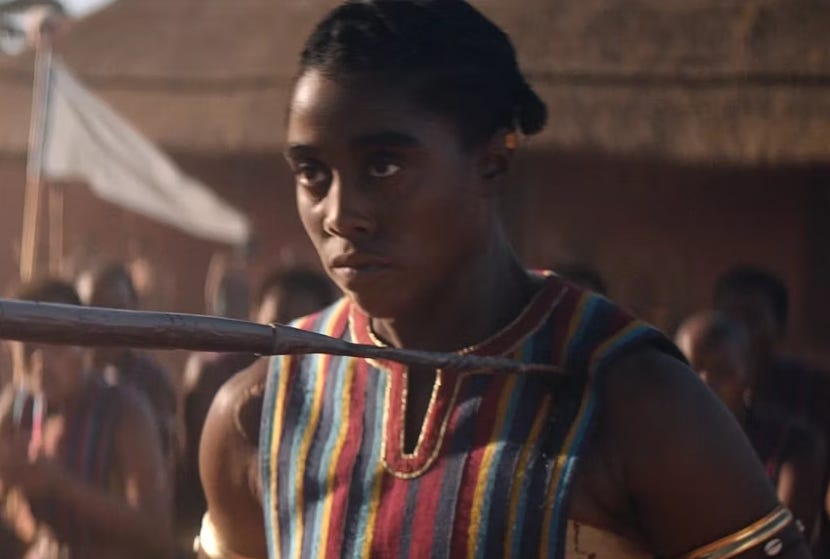The Woman King
Agojie! Wu Suu!
With The Old Guard (2020), Gina Prince-Bythewood became the first Black woman to direct a big-budget superhero movie, upsetting trolls who insist women wreck such films. It’s funny that with The Woman King (2022), a work of historical fiction, she does precisely that. Prince-Bythewood reaches into the past and ruins comic-book movies I had enjoyed years before, exposing them as shallow and morally unpalatable.
It’s hard to watch The Woman King or Black Panther (2018) without considering the other since both feature a band of elite women soldiers. Black Panther has the Dora Milaje and The Woman King the Agojie.
We first meet the Agojie when they emerge from the tall grass on the outskirts of a Mahi village. Led by General Nanisca (Viola Davis) and armed with swords, spears, and sharpened fingernails, they overwhelm the men who had kidnapped women from the kingdom of Dahomey. The Agojie fight with persistent, inevitable strength as well as agility that borders on elegance. They drive spears into guts, slice throats, hack clavicles, and pluck out eyes. They take losses, but in the end, they rescue the Dahomey women the Mahi had intended to sell to European slavers.
Dahomey is also guilty of supplying the slave trade, which has brought prosperity and security. However, Nanisca recognizes slavery as a self-perpetuating evil weakening Africa. (“It is a poison slowly killing us, and the Europeans know this…Why do we sell our captives? For weapons? To capture more people to sell for more weapons?) Upon returning to Dahomey, Nanisca convinces King Ghezo (John Boyega) to stop selling Africans into slavery.
While the Dahomey rejected the slave trade, the Wakandans did nothing to end slavery even when they had the means to do so as the strongest, most technologically advanced nation throughout human history. They followed a policy of non-intervention, turning their backs on everything that happened outside their borders.
Both Black Panther movies are silent on this failure to act. The closest they come is addressing the immorality of Wakanda’s general indifference. In the prologue of the first movie, the old-school Black Panther travels to Oakland to stop a Wakandan prince from selling vibranium and providing arms to oppressed people. By the epilogue, Wakandans drop their policy of isolation, but this does not atone for their original sin. Allowing slavery to flourish is a grievous transgression, especially within the Marvel universe where great power comes with great responsibility. By their inaction, Wakandans are little more than the arrogant inheritors of great privilege, and maybe it would have been better had they been washed into the sea in the second Black Panther movie.
After Nanisca returns to Dahomey, she begins training new soldiers, and during this engaging training sequence where Prince-Bythewood reveals what is at the center of Agojie identity, my affection for Zack Snyder’s 300 (2006) fades.
Prince-Bythewood shows us warriors with unfathomably painful pasts who have not hardened their hearts, somehow retaining their compassion for others and passion for living. Izogie (Lashana Lynch), Nanisca’s charismatic lieutenant, leads the training of recruits, one of which is the young and fiery Nawi (Thuso Mbedu). Izogie guides her young charges with gentle teasing and her impressive example. For example, Nawi’s training suffers from her poor attitude. She is mired in self-pity, fixated on her unfair childhood and the recent abandonment by her father, which is what had brought her to the Agojie. Izogie cures Nawi of her resentment by telling her about her own childhood when her mother sold her virginity to passersby.
During the training sequence, we see this common trait shared by the Agojie. They are a sisterhood of warriors who survived sexual violence and betrayal. They are not magical beings, which is what Nawi had believed before joining their ranks. Some of them are regular, old women, who draw strength from the horrors they have endured to become skillful warriors. They are not victims. They are joyful women who sing, dance, and then die together.
In 300, Spartans are simple killing machines. They desire little besides the thrill of killing and the honor of dying in battle. They do not have complicated pasts. They lack personality and are often difficult to distinguish. To put it in a way Greeks would understand, they are merely shadows projected on the cave walls. Snyder went too far in his disdain for character development. Who are the Spartans? Snyder reduces them to pretty men good with spears, and when compared to the Agojie, they are ridiculous cardboard cutouts.
The final movie I now despise is Captain Marvel (2019), which wasted the talents of Lashana Lynch--the beating heart of The Woman King. I wouldn’t blame you for not remembering her in the role of Maria Rambeau (like a French lady-Rambo?). She played a standard, interchangeable sidekick. But another reason you might not remember her is because Marvel did their best to hide her and her bold, beautiful eyebrows under a drab wig. What they did to Lynch is a crime that makes Captain Marvel unwatchable.
Exhibit A.
Exhibit B.
When Scorsese complained that Marvel movies are not cinema, I dismissed him as an old man yelling for you to get off his lawn, but now, I agree. Most comic-book movies do not survive the comparison to real cinema, and honestly, I feel a bit silly having attempted it.
The Woman King
Written by Dana Stevens and Maria Bello; Directed by Gina Prince-Bythewood
2022
135 minutes
English



